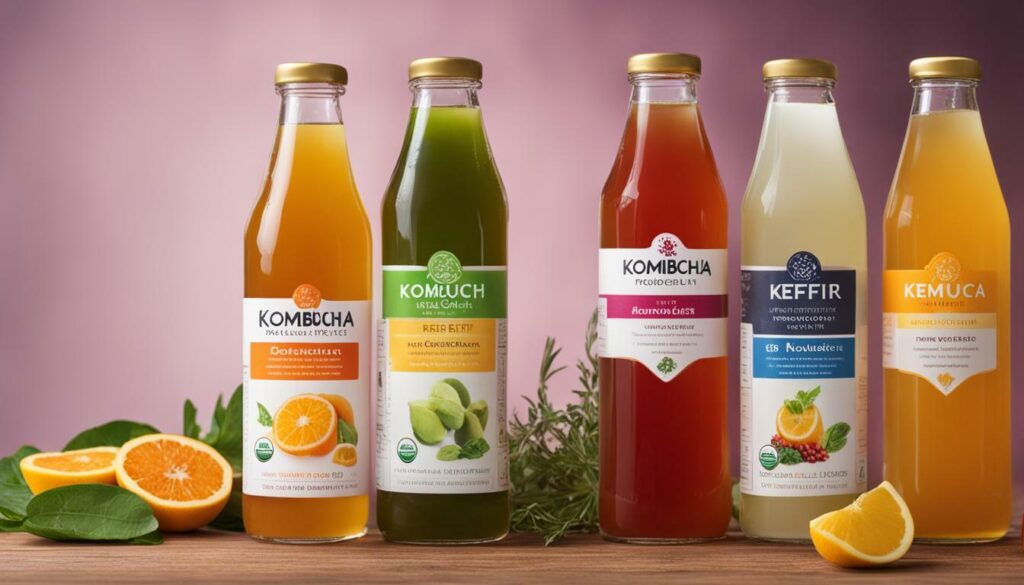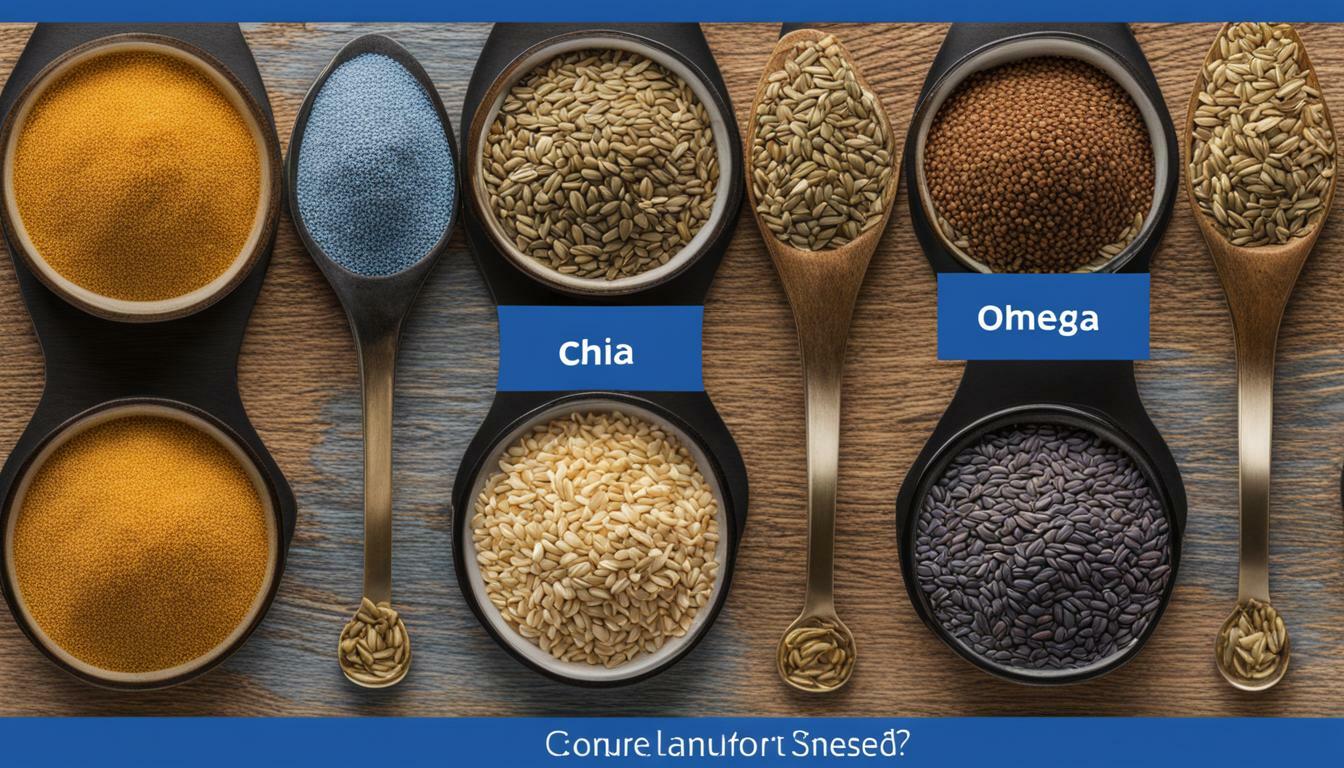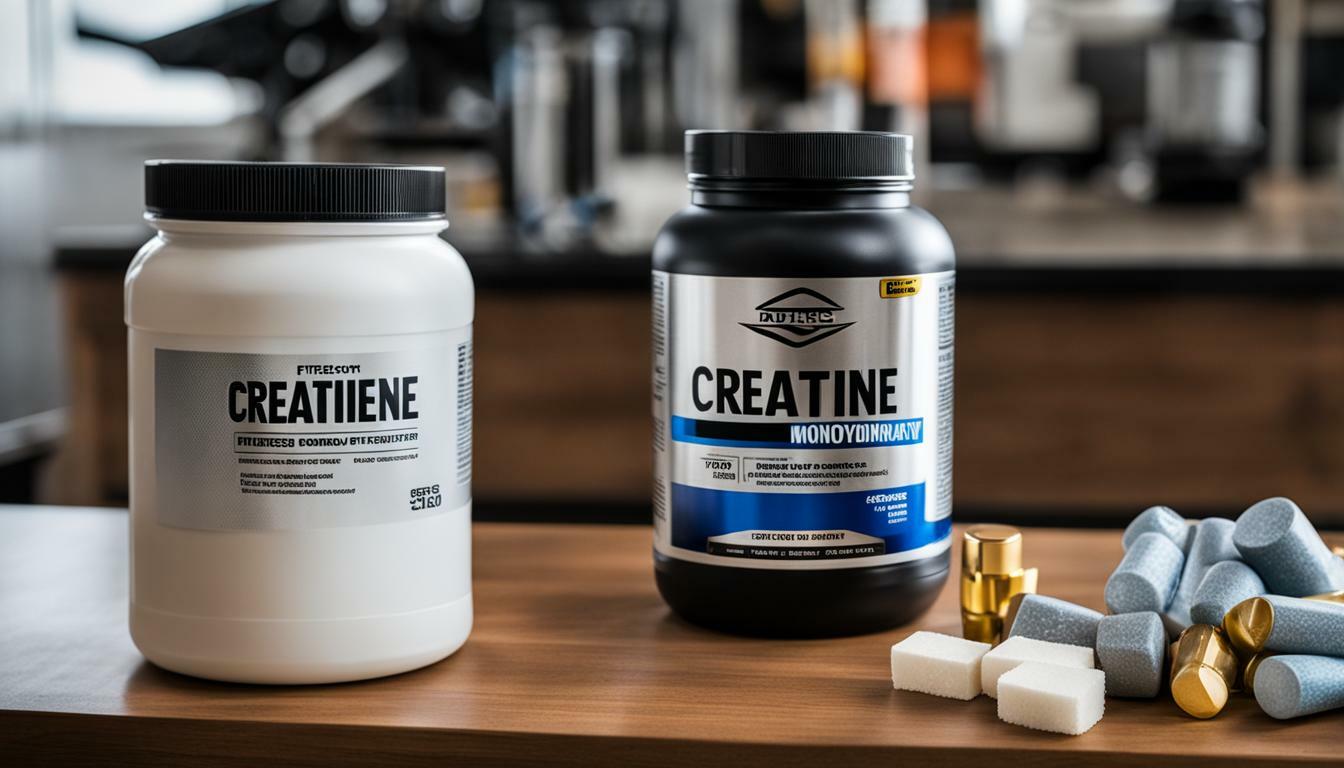Kombucha and kefir are both popular fermented beverages that contain probiotics, but they have distinct differences that set them apart. Kefir is a fermented dairy beverage made by adding kefir grains to milk, while kombucha is a fermented tea beverage made by fermenting sweetened tea with a symbiotic culture of bacteria and yeast.
Kefir has a tangy and slightly sour taste, and it is rich in protein, calcium, vitamin B12, and probiotics. On the other hand, kombucha has a bubbly and slightly vinegary taste, and it is low in calories and carbohydrates. While kefir is more filling and nutritious, kombucha is lighter and more refreshing.
Both beverages offer probiotic benefits, promoting gut health and overall well-being. However, the exact strains and amounts of probiotics may vary. This means that the choice between kefir and kombucha ultimately depends on personal preferences and dietary needs.
- Kefir is a fermented dairy beverage, while kombucha is a fermented tea beverage.
- Kefir has a tangy and slightly sour taste, while kombucha has a bubbly and slightly vinegary taste.
- Kefir is rich in protein, calcium, vitamin B12, and probiotics, while kombucha is low in calories and carbohydrates.
- Both kefir and kombucha offer probiotic benefits, but the exact strains and amounts may vary.
- The choice between kefir and kombucha depends on personal preferences and dietary needs.
Health Benefits of Kombucha and Kefir Probiotics
Both kombucha and kefir probiotics offer a range of health benefits, making them excellent choices for those seeking to improve their gut health. These fermented beverages are packed with beneficial bacteria and yeasts that can support digestion, boost the immune system, and promote overall well-being. Let’s explore the specific health benefits of kombucha and kefir probiotics.
- Gut Health: Kombucha and kefir probiotics are known for their ability to promote a healthy gut microbiome. They contain live cultures that help restore and maintain the balance of bacteria in the digestive system. This can improve digestion, reduce bloating, and alleviate symptoms of gastrointestinal disorders.
- Immune Support: The probiotics found in kombucha and kefir can strengthen the immune system by enhancing the production of antibodies and activating immune cells. This can help protect against infections and reduce the severity of common illnesses.
- Nutrient Absorption: The probiotics in kombucha and kefir can enhance the absorption of essential nutrients, such as vitamins and minerals, in the body. This is especially beneficial for individuals with nutrient deficiencies or malabsorption issues.
- Inflammation Reduction: Chronic inflammation is linked to various health conditions, including autoimmune disorders and digestive disorders. The probiotics in kombucha and kefir have anti-inflammatory properties that can help reduce inflammation and support overall wellness.
Both kombucha and kefir probiotics offer a range of health benefits, including improved gut health, enhanced immune support, better nutrient absorption, and reduced inflammation.
To fully reap the health benefits of kombucha and kefir probiotics, it is important to incorporate them into a balanced diet and consume them regularly. It is also worth noting that individual responses to probiotics can vary, so it may take some experimentation to find the most beneficial option for your body.

| Kombucha | Kefir |
|---|---|
| Rich in antioxidants | High in protein |
| Helps detoxify the body | Good source of calcium |
| Supports liver function | Provides vitamin B12 |
| May aid in weight management | Offers probiotic benefits |
As seen in the table, kombucha offers antioxidant properties and supports liver function, while kefir is rich in protein and provides essential nutrients like calcium and vitamin B12. Both beverages contribute to gut health through their probiotic content, but kombucha may be preferred for its detoxification benefits, while kefir is a good choice for those looking to increase their protein intake.
The Fermentation Process of Kombucha and Kefir Probiotics
Kombucha and kefir probiotics undergo different fermentation processes, resulting in their distinct taste profiles and nutritional compositions. Let’s take a closer look at how these two popular fermented beverages are made.
Kombucha starts with a sweetened tea base, typically black or green tea, which is then fermented with a symbiotic culture of bacteria and yeast known as a SCOBY. The SCOBY consumes the sugar in the tea and produces a range of organic acids, including acetic acid, which gives kombucha its characteristic tangy flavor. The fermentation process takes several days to a few weeks, during which time the SCOBY creates carbon dioxide, resulting in the fizzy nature of the drink.
Kefir, on the other hand, is made by adding kefir grains to milk. Kefir grains are a combination of bacteria and yeast that create a gelatinous matrix. The grains ferment the lactose in the milk, breaking it down into lactic acid, which gives kefir its slightly sour taste. The fermentation of kefir takes around 24 to 48 hours, depending on the desired level of tartness.
While both kombucha and kefir undergo fermentation, their different ingredients and microbial compositions lead to variations in taste and nutritional content. Kombucha is known for its tangy, slightly vinegary flavor, while kefir has a tangy and slightly sour taste. Kombucha is low in calories and carbohydrates, making it a popular choice for those watching their sugar intake. On the other hand, kefir is higher in protein, calcium, vitamin B12, and probiotics, making it a more filling and nutritious option.
| Characteristic | Kombucha | Kefir |
|---|---|---|
| Taste | Tangy and slightly vinegary | Tangy and slightly sour |
| Calories | Low | Varies depending on milk used |
| Carbohydrates | Low | Varies depending on milk used |
| Protein | Minimal | Higher |
| Calcium | Some | Higher |
| Vitamin B12 | Minimal | Higher |
| Probiotics | Various strains and amounts | Various strains and amounts |
Overall, both kombucha and kefir offer unique taste profiles and potential health benefits. The choice between the two ultimately comes down to personal preferences and dietary needs. Whether you prefer the bubbly and refreshing nature of kombucha or the creamy and nourishing qualities of kefir, incorporating either of these probiotic-rich beverages into your diet can contribute to overall gut health and well-being.
Did you know?
“Kombucha and kefir have been enjoyed for centuries across various cultures for their health-promoting properties.”
Flavor Profiles of Kombucha and Kefir Probiotics
Kombucha and kefir probiotics offer distinct flavor experiences, appealing to different taste preferences and dietary restrictions. Kefir, a fermented dairy beverage, has a tangy and slightly sour taste that is reminiscent of yogurt. It has a creamy texture and can be enjoyed plain or flavored with fruits and spices. Kefir’s flavor is well-balanced, with a pleasant acidity and a hint of sweetness.
Kombucha, on the other hand, has a bubbly and slightly vinegary taste that is both tangy and refreshing. It has a unique flavor profile that combines the sweetness of the tea with the tartness of the fermentation process. Kombucha is often described as having a fizzy quality, making it an enjoyable alternative to carbonated beverages. Its flavors can range from fruity and floral to earthy and herbaceous, offering a wide variety of options to suit different palates.
When choosing between kombucha and kefir, it is important to consider your personal taste preferences. If you enjoy the tanginess of yogurt and the creaminess of dairy products, kefir may be the better choice for you. On the other hand, if you prefer a lighter and more refreshing beverage with a unique fizzy quality, kombucha may be the perfect fit. It is also worth noting that kefir is a dairy-based product, so individuals with lactose intolerance or dairy allergies may prefer kombucha, which is dairy-free.
| Kefir Probiotics | Kombucha Probiotics | |
|---|---|---|
| Taste | Tangy, slightly sour | Bubbly, slightly vinegary |
| Texture | Creamy | Fizzy |
| Flavors | Well-balanced, slightly sweet | Varied, fruity, floral, earthy |
| Allergen | Contains dairy | Dairy-free |
Whether you choose kefir or kombucha, both beverages provide probiotic benefits that can promote gut health and overall well-being. The probiotics in kefir and kombucha help to support a healthy balance of bacteria in the gut, which is essential for digestive and immune function. Additionally, both drinks are low in calories and can be enjoyed as a refreshing alternative to sugary beverages.
So, whether you’re looking for a creamy and tangy option or a fizzy and vinegary delight, both kombucha and kefir probiotics offer unique flavor profiles that cater to different tastes and dietary needs. Explore and experiment with these fermented beverages to find the one that suits your palate and provides the gut health benefits that you desire.

Kombucha and kefir probiotics differ in their nutritional composition, offering unique combinations of vitamins, minerals, and probiotics. Let’s take a closer look at the nutritional content of these two fermented beverages:
Kombucha: This bubbly and lightly vinegary tea-based drink is low in calories and carbohydrates. It is a rich source of B vitamins, including B1 (thiamine), B2 (riboflavin), B3 (niacin), and B12. Kombucha also contains antioxidants, such as polyphenols and catechins, which help protect the body against oxidative stress. In addition, it provides small amounts of minerals like potassium, magnesium, and iron. The probiotic content of kombucha can vary depending on the fermentation process and the specific strains used, but it typically contains beneficial bacteria like Lactobacillus and Bifidobacterium.
Kefir: Made from fermenting kefir grains in milk, this tangy dairy beverage is known for its exceptional nutritional profile. It is a great source of protein, calcium, and vitamin B12, making it an excellent choice for those looking to boost their nutrient intake. Kefir is also rich in vitamins A, D, and K, as well as minerals like phosphorus and magnesium. The probiotics found in kefir are diverse, including strains like Lactobacillus, Streptococcus, and Bifidobacterium.
Both kombucha and kefir probiotics offer distinct nutritional benefits, so it’s worth incorporating them into your diet based on your specific needs. While kombucha is a lighter and more refreshing option, kefir is more filling and packed with nutrients. Remember that individual brands and homemade versions may vary in their nutritional content, so always check the label or consult a nutritionist for detailed information.

| Kombucha | Kefir | |
|---|---|---|
| Calories (per 8 oz) | 30-50 | 110-150 |
| Carbohydrates (g) (per 8 oz) | 5-10 | 10-15 |
| Protein (g) (per 8 oz) | 0.5-1 | 8-10 |
| Vitamin B12 (mcg) (per 8 oz) | 0.1-0.2 | 1-1.5 |
| Calcium (mg) (per 8 oz) | 10-20 | 300-400 |
| Probiotic Strains | Lactobacillus, Bifidobacterium | Lactobacillus, Streptococcus, Bifidobacterium |
Conclusion
Choosing between kombucha and kefir probiotics ultimately comes down to individual preferences and dietary requirements. Both beverages offer unique characteristics and benefits that can contribute to overall gut health and well-being.
Kefir, a fermented dairy beverage made with kefir grains and milk, is rich in protein, calcium, vitamin B12, and probiotics. It has a tangy and slightly sour taste, making it a filling and nutritious option. Kombucha, on the other hand, is a fermented tea beverage made with sweetened tea and a culture of bacteria and yeast. It has a bubbly and slightly vinegary taste, providing a lighter and more refreshing option.
While kefir may be more satisfying and nutrient-dense, kombucha offers a low-calorie and low-carbohydrate alternative. Both beverages contain probiotics, which are beneficial bacteria that support gut health. However, it is important to note that the specific strains and quantities of probiotics may differ between kombucha and kefir.
When deciding between kombucha and kefir probiotics, it is essential to consider personal preferences, dietary restrictions, and health goals. Some individuals may prefer the creamy texture of kefir, while others may enjoy the fizzy nature of kombucha. Those with lactose intolerance may opt for kombucha, as it is dairy-free, whereas individuals looking for a protein-rich option may choose kefir. Additionally, consulting with a healthcare professional or nutritionist can provide further guidance on selecting the most suitable probiotic beverage for individual needs.
FAQ
What is the difference between kombucha and kefir probiotics?
Kombucha and kefir probiotics are both fermented beverages that contain probiotics, but they have some key differences. Kefir is a fermented dairy beverage made with kefir grains and milk, while kombucha is a fermented tea beverage made with sweetened tea and a symbiotic culture of bacteria and yeast. They have different taste profiles and nutritional content.
What are the health benefits of kombucha and kefir probiotics?
Both kombucha and kefir probiotics offer health benefits. They promote gut health and digestion, boost the immune system, and may have anti-inflammatory properties. Additionally, kefir is rich in protein, calcium, and vitamin B12, while kombucha is low in calories and carbohydrates.
How are kombucha and kefir probiotics fermented?
Kombucha is fermented by combining sweetened tea with a symbiotic culture of bacteria and yeast, which creates a fizzy and slightly vinegary beverage. Kefir is made by adding kefir grains to milk, allowing the grains to ferment the sugars in the milk, resulting in a tangy and slightly sour beverage.
What do kombucha and kefir probiotics taste like?
Kombucha has a bubbly and slightly vinegary taste with a hint of sweetness. Kefir has a tangy and slightly sour taste due to the fermentation process. The taste of both beverages can vary depending on the specific brand and flavor.
What is the nutritional content of kombucha and kefir probiotics?
Kefir is rich in protein, calcium, vitamin B12, and probiotics. It is also a good source of vitamins and minerals. Kombucha, on the other hand, is low in calories and carbohydrates and contains probiotics. The exact nutritional content may vary depending on the specific brand and preparation method.
 Skip to main content
Skip to main content


